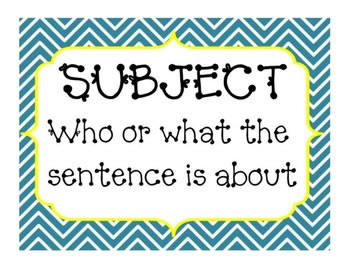Difference between Noun and Subject
Key difference: A noun is a word used to identify a class of people, places, objects, happenings, etc. A subject is any person, or a thing that is being talked about, or dealt with in a sentence.
.jpg) Nouns are an integral part of speech in English grammar. These words help us identify objects, people, and places by their names, and classify them as per our convenience. Nouns are often one of the most important parts of a sentence along with a verb, which is a word used for denoting action in a sentence. Basically, nouns are of two types:
Nouns are an integral part of speech in English grammar. These words help us identify objects, people, and places by their names, and classify them as per our convenience. Nouns are often one of the most important parts of a sentence along with a verb, which is a word used for denoting action in a sentence. Basically, nouns are of two types:
Common Nouns: As the name suggests, these nouns are names in general. These could be the names of a person, place, thing, etc. The first alphabet of a common noun is never capitalized, unless it opens a sentence. Common nouns are more or less the different names that we use in our daily life.
For example:
Please take these chocolates.
Proper Nouns: These are the nouns used to describe particular places, people, significant happenings, etc. Words like these always have their first alphabet in capital as a rule. The names of the days in a week, religious texts, historical monuments, etc. are required to be used as proper nouns.
For example:
Ronald Reagan had visited the Great Wall of China.
In addition to the above, some other examples of using nouns in a sentence are:
- Fred bought the pencil.
- The cat chased the mouse.
- The clerk greeted her.
- He drove that truck.
- She has already left forTokyo.
 Subject, as suggested by the name, is very simply that which is being discussed in a sentence. A subject is often followed by a predicate, which contains the verb clause of a sentence, and also some information about the subject. A subject is often used at the beginning of a sentence. It indicates who or what the sentence is about.
Subject, as suggested by the name, is very simply that which is being discussed in a sentence. A subject is often followed by a predicate, which contains the verb clause of a sentence, and also some information about the subject. A subject is often used at the beginning of a sentence. It indicates who or what the sentence is about.
Many times, it is observed that a noun is often the subject of a sentence. This is only natural, as nouns are often the topics of discussion in a sentence. To substantiate further, a subject could be looked at as a:
Thing, i.e. what is being talked about in a sentence
Person, i.e. who is being talked about in a sentence
Place, i.e. the name of a region or a site being talked about in a sentence
Event, i.e. an occurrence being talked about in a sentence
One can understand this phenomenon better by leaning how it works in a sentence.
For example:
Suzanne goes to the library.
In the sentence above, the word ‘Suzanne’ is our subject. However, it is also one of the nouns, along with the word ‘library’. The word ‘goes’ depicts the action of going to a destination, which in this case is a library. So, the word ‘goes’ is our verb. Now if we look at the sentence closely we will find that out of the two nouns, ‘Suzanne’ is closest to being the subject. This is because the word ‘Suzanne’ is a noun, is mentioned at the beginning of the sentence, and is also followed by a predicate. Moreover, the focus of the sentence rests on this word, which is the person performing a specific action, i.e. going to the library in this event. Hence, the word ‘Suzanne’ is derived as the subject of this sentence.
Few other examples of subjects used in sentences are:
- The girl ran to her room
- Are you ready?
- Didn’t we talk yesterday?
- After his lunch, Mark had dessert.
- Nestor goes to the office early.
Comparison between Noun and Subject:
|
|
Noun |
Subject |
|
Meaning |
A noun is a word used to identify a class of people, places, objects, happenings, etc. |
A subject is any person, or a thing that is being talked about or dealt with in a sentence. |
|
Types |
Proper, common, collective, countable, etc. |
Noun subject, pronoun subject, indefinite subject, clause subject, etc. |
Image Courtesy: ladybugsteacherfiles.com, teacherspayteachers.com









Add new comment